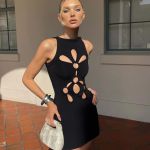
Are avatars and digital influencers the future of fashion?
The evolution of digital in the fashion industry, from gaming to virtual models
July 22nd, 2020
It seems weird to say that, but not all influencers go on holiday. Some of them can work 24 hours a day, every day of the week, without the need for social distancing and, most important, they are staying young forever. Magic? No, technology.
We're talking about particular “digital” influencers and celebrities who are establishing themselves in the luxury market and could change the rules of the fashion world, already in full revolution. In China and Japan, playing with real and virtual has long been the normality, so much that a famous digital pop star, Hatsune Miku - to be honest she looks more like an anime than a real person - has been on the scene since 2007, also signing collaborations with Google and Toyota and later with Louis Vuitton and Givenchy.
The online platform Vsinger, managed by Yamaha, keeps pushing singers (Yanhe, Yuezheng Ling and Yuezheng Longya to mention a few) that are able to conquer the Generation Z with Instagram directs followed by millions of users, sometimes adding the participation of "human" influencers. The "gaming" element is also very strong in this case, so much so that virtual bands are often created starting from video game characters, as in the case of League of Legends, whose co-branded collaboration with Louis Vuitton went sold out in few minutes.
The world of video games has also started to blend with the one of beauty thanks to sponsorship contracts with popular brands like Mac Cosmetics and Head & Shoulders. Now even the brands of the fashion world are starting to create their own virtual testimonials. In the beginning were the mascots, like Fendidi, the panda created by Fendi and Jackson Wang, Bape Milo of Bape, the Kaws doll by Dior and the limited edition doll Tokidoki x Karl Lagerfeld, now are the other inanimate testimonials. Just think also of the successful boom during the quarantine of Animal Crossing, whose lovely avatars started to dress Prada, Gucci and Supreme, up to a virtual Fashion Show organized on the platform - going beyond the boundaries of traditional gaming as we know it.
Mnay brands and magazines are starting to implement their campaigns and editorial contents with virtual figures, from models to settings and clothing and accessories, entirely designed through codes and numbers. It seems that the audience is getting used to dealing with this type of digital image. For example, we all remember Calvin Klein's campaign last year where Bella Hadid was kissing Lil Miquela, the pioneer of virtual models, now managed by a real agency and influencer with more than 2.5 million followers; a year later the beautiful black digital model Shudu arrived; and again the Dior FW 2019 collection, was inspired by the futuristic works and robotic-human figures of the artist Hajime Sorayama. The "humanoids" also had the chance to visit Milan with the editorial by nss magazine for the Louis Vuitton SS19 collection, and lake Como where they were wearing the Dior x Stüssy collection.
More recently, the Dutch brand Daily Paper presented its SS20 collection with alien models, and the latest SS21 collection with a 3D campaign created by the artist @samylacrapule, who also collaborated with nss magazine on the occasion of the latest digital cover. Moreover, the Italian brand Sunnei presented the first part of the SS21 collection with Sunnei Canvas, a platform populated by a series of male and female avatars with a human appearance and created by the brand in collaboration with the Milanese studio @pezzodistudio.
Not only Lil Miquela. The turnover around these "special" models keeps growing and agencies specialized in representing this category of models also appeared, like the British The Diigitals, able to create not only digital versions of real models, making them wear the items of famous brands, but also beautiful and completely virtual girls. Another example is IMG Sims, a digital agency worldwide that deals with virtual models, inspired by the Sims of the famous simulation game "The Sims", like those of @skinnycleo.
Who knows what these "virtual celebrities" will hold for us in the future and how much they will be able to give voice to the topics of diversity and equality that the industry is focusing on. Being able to transcend ethnicity, geographic position, tastes and desires, we could even imagine models and influencers with alien features, doing photoshootings in space.







































